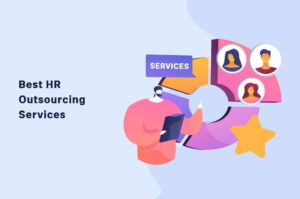Our reviewers evaluate software independently. Learn how we stay transparent, our methodology, and tell us about anything we missed.

Outsourcing has become a vital strategy for many businesses aiming to optimize their operations, reduce costs, and focus more on their core competencies.
One department that businesses often consider for outsourcing is Human Resources (HR).
The question then arises, can you outsource your HR department? The straightforward answer is, yes, you can.
Many businesses worldwide are successfully doing so, gaining access to a wide range of expertise and advanced HR technologies without the need to maintain a full-fledged in-house HR department.
Outsourcing your Human Resources (HR) department is a strategic move that involves delegating your company’s HR functions to external experts. The essence of HR outsourcing is simple: businesses employ the services of other businesses, typically HR service providers, to manage tasks that would otherwise be handled in-house. These tasks can range from payroll processing to employee benefits administration.
Different types of HR outsourcing models exist, ranging from a comprehensive outsourcing of all HR functions to selective outsourcing, where only certain HR activities are delegated to an external provider. The extent of HR outsourcing depends largely on the business’s needs, size, and strategic goals.
The benefits associated with outsourcing your HR department are as follows.
HR functions that your organization can outsource are categorized as follows
Recruitment and Onboarding: Recruitment and onboarding are labor-intensive processes that require substantial time and expertise. By outsourcing these tasks, businesses can tap into a wider pool of candidates and ensure a smooth onboarding process for new hires.
Payroll Administration: Payroll administration involves keeping track of employees’ working hours, calculating wages, withholding taxes and deductions, and issuing paychecks. An outsourced provider can handle these tasks efficiently and accurately.
Benefits Administration: Managing employee benefits is complex and requires deep knowledge of the various options available, as well as legal requirements. Outsourced providers can handle everything from health insurance to retirement plans.
Training and Development: Training and development are essential for employee growth and productivity. Outsourced HR providers can offer specialized training programs and track employee progress.
Performance Management: Regular evaluation of employee performance is important to ensure productivity and growth. An outsourced provider can set up efficient performance management systems and conduct evaluations.
Legal Compliance: Outsourced HR providers can ensure that your business stays compliant with employment laws and regulations, mitigating legal risks.
Employee Relations: Managing employee grievances and conflicts is a sensitive task that requires expertise and impartiality. Outsourced HR providers can handle this effectively, promoting a positive work environment.
HR Strategy and Consulting: Outsourced HR providers can also provide strategic consulting, helping businesses to align their HR policies with their business goals.
Below are the various aspects to take into consideration when outsourcing your HR department.
Company Size: Smaller companies may benefit more from HR outsourcing due to the high costs associated with running an in-house HR department.
Business Goals: Your long-term business goals and strategy should align with your decision to outsource your HR department.
Cost vs. Benefit: It’s crucial to do a thorough cost-benefit analysis before deciding to outsource your HR functions.
Control over HR Functions: Outsourcing HR functions means giving up some control. You need to consider whether you’re comfortable with this.
Quality of Service: Look at the reputation and track record of the HR service provider before deciding to outsource.
Data Security: Since sensitive employee data will be handled by the outsourced provider, ensure they have robust security measures in place.
HR Tasks to Outsource: Identify which HR tasks you want to outsource. Not all HR functions need to be outsourced.
Employee Impact: Consider how outsourcing your HR department will impact your employees.
Legal Compliance: Ensure the HR service provider is knowledgeable about employment laws and regulations.
Provider’s Expertise and Experience: Assess the expertise and experience of the HR service provider.
Determining whether HR outsourcing is suitable for your organization involves a thorough analysis of your current HR functions and future needs. Start by conducting an HR audit to evaluate the performance of your in-house HR department.
Analyze the cost-effectiveness of maintaining your in-house HR team. Consider the costs of salaries, benefits, training, HR technology, and office space. Compare these costs with the fees of HR service providers to see if outsourcing would be more cost-effective.
Consider the complexity of your HR tasks. If your HR tasks are highly specialized or complex, it might be more efficient to outsource them to experts. Conversely, if your HR tasks are simple and straightforward, maintaining an in-house HR team might be more beneficial.
Evaluate your company’s growth plans. If you plan to expand your business, an outsourced HR provider can offer scalability that an in-house HR team might not be able to provide.
Lastly, consider the impact of HR outsourcing on your employees. Employee relations and morale are important considerations. Ensure that the decision to outsource HR is communicated effectively to your employees and that their concerns are addressed.
HR outsourcing, while beneficial, also comes with its fair share of risks and challenges. One of the main concerns is the loss of control over your HR functions. Outsourcing means handing over a significant part of your operations to a third party, which can lead to issues if the service provider does not fully align with your company’s values and culture.
Data security is another significant risk. Outsourced providers will handle sensitive employee data, and any data breach could have serious consequences.
Quality of service can also be a concern. If the service provider does not deliver the expected level of service, it could negatively impact your HR operations and employee satisfaction.
Cultural misalignment can be another challenge. The outsourced provider may not fully understand your company’s culture, which could lead to conflicts and misunderstandings.
Finally, there could be hidden costs associated with HR outsourcing. This could include setup fees, fees for additional services not covered in the original agreement, and the costs associated with switching providers if the outsourcing arrangement does not work out.
In-house HR departments offer the benefit of having HR professionals who are deeply embedded in your company’s culture and operations. They are on-site and readily available to address HR issues. However, they can be more expensive to maintain, especially for small businesses, and may not have access to the latest HR technology and best practices.
On the other hand, outsourced HR departments offer cost savings, access to expertise and advanced technology, and the flexibility to scale services according to your needs. However, they can pose risks in terms of data security and loss of control over HR functions. They may also not be as attuned to your company culture as an in-house team.
Ultimately, the decision between in-house and outsourced HR depends on your company’s size, needs, and strategic goals. It’s crucial to carefully consider the pros and cons of each option before making a decision.
Finding the right HR outsourcing provider involves a thorough evaluation of your options. Start by identifying your HR needs and defining the scope of services you want to outsource.
Next, research potential providers. Look at their reputation, track record, expertise, and the range of services they offer. Check client testimonials and reviews to gauge the quality of their services.
Once you have a shortlist of potential providers, request proposals and conduct interviews. This will give you an opportunity to assess their professionalism, responsiveness, and alignment with your company’s values and goals.
Before making a decision, verify the provider’s compliance with laws and regulations and their data security measures. You may also want to ask about their service recovery procedures in case of errors or issues.
Then, negotiate a clear, comprehensive contract that outlines the scope of services, fees, terms and conditions, and resolution procedures for any disputes that may arise.
Ensuring data security and confidentiality is paramount when outsourcing your HR department. HR functions deal with sensitive employee data, including personal information, compensation details, and health records. Any breach of this information could lead to severe reputational damage and legal repercussions.
Start with selecting an HR service provider who prioritizes data security. They should demonstrate a solid track record in handling sensitive data, with no history of data breaches. Inquire about their data security policies, practices, and infrastructure. They should have robust firewalls, secure servers, data encryption, and antivirus software in place to protect your data.
Ensure they are compliant with data protection laws such as the General Data Protection Regulation (GDPR) and local privacy laws. The provider should have clear policies for data access, data sharing, data storage, and data destruction. Only authorized personnel should have access to your data, and there should be strict controls on who can share the data and under what circumstances.
Ensure the provider carries out regular security audits and risk assessments. This will help identify any potential vulnerabilities and rectify them before they can be exploited.
Include confidentiality clauses in your contract with the provider. The provider should commit to maintaining the confidentiality of your data and not using it for any purposes other than providing HR services.
Lastly, prepare for the possibility of a data breach. Have a contingency plan in place detailing what steps to take in the event of a breach, including notifying affected parties, investigating the breach, mitigating the damage, and preventing future breaches.
Communication and collaboration are key to a successful partnership with an outsourced HR department. Here’s how you can manage it effectively
Set Clear Expectations: Begin by setting clear expectations about the level and frequency of communication you expect. The provider should understand your preferred communication channels, whether it’s email, phone calls, video conferencing, or a combination of these.
Regular Updates and Reports: Insist on regular updates and reports to stay informed about the provider’s activities and performance. This could be in the form of weekly or monthly updates, and quarterly or annual reports.
Establish Points of Contact: Have dedicated points of contact on both sides. This will ensure that communication is streamlined and that there are specific people responsible for addressing any issues or concerns.
Use Collaboration Tools: Utilize collaboration tools to facilitate seamless communication. This could include project management tools, shared calendars, video conferencing tools, or a shared cloud workspace.
Encourage Open Communication: Promote a culture of open communication. The provider should feel comfortable bringing up any issues or concerns, and there should be a process in place to address them promptly.
Regular Meetings: Hold regular meetings to discuss progress, address any issues, and plan for the future. These could be weekly, monthly, or quarterly meetings, depending on your needs.
Feedback Mechanism: Have a feedback mechanism in place. This will allow both sides to provide feedback on what’s working well and what needs improvement.
Remember, effective communication and collaboration are a two-way street. It requires effort and commitment from both sides. It’s crucial to maintaining a positive, productive relationship with your outsourced HR department.
Some of the legal considerations you ought to take into account when outsourcing HR functions include:
In this section, we answer some common questions about outsourcing HR departments.
Outsourcing HR department refers to the delegation of your business HR tasks to a professional HR outsourcing service.
HR outsourcing services can provide numerous advantages including cost reductions, access to a wide range of expertise, heightened efficiency, scalability, and increased concentration on fundamental business operations.
The HR services frequently outsourced include recruitment and onboarding, payroll processing, benefits administration, training and development, performance management, legal compliance, employee relations, and HR strategy consulting.
Outsourcing HR services can come with certain risks like loss of control over HR tasks, data security threats, possible service quality decline, cultural misalignment, and undisclosed costs.
Business owners should weigh considerations such as their business size, organizational goals, cost-effectiveness, control over HR tasks, service quality, data security, HR tasks to outsource, the impact on employees, legal compliance, and the expertise and experience of the HR outsourcing company.
To find the best HR outsourcing services, start by identifying your HR needs, carry out thorough research on potential HR outsourcing companies, request for proposals, conduct interviews, verify compliance and security measures, and negotiate a comprehensive and transparent contract.
A professional employer organization (PEO) is an HR outsourcing firm that provides comprehensive HR solutions to their clients. They handle various HR tasks, allowing business owners to focus more on their core competencies.
Get the weekly newsletter keeping 30,000+ HR pros in the loop.









Get our #1 industry rated weekly technical writing reads newsletter.